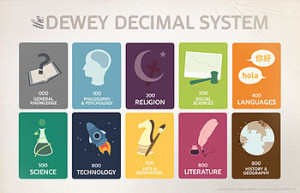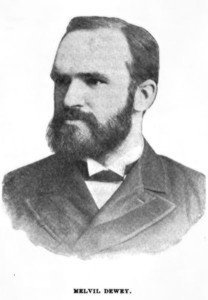I had the great honor to be asked to guest edit the November/December 2013 issue of Knowledge Quest, the journal of AASL. The theme was Dewey or Don’t We, a pro-con look at a growing practice among school (and public librarians) to go from the Dewey Decimal System to a genre-based one. I am again gathering my thoughts on the topic in preparation for writing an article for the February/ March 2014 issue of School Librarian’s Workshop and thought I would give my blog readers a preview.
The genesis of the Knowledge Quest issue goes back to the AASL Affiliate Assembly meeting at ALA Annual in 2012. The delegates from the Kansas Association of School Librarians brought a Statement of Concern asking AASL for guidance and leadership on how to approach a growing trend of genre-fying the collection. In addition to wanting AASL to take a position, KASL wanted some way to standardize the new classifications if that is the way we were going. The resolution passed, meaning the AASL Board had to address it. A “Hot Topic” panel was assembled for ALA Midwinter 2013, and I was the facilitator. The room was packed—standing room only—and while opinions didn’t necessarily change, most left with new perspectives and new questions. To deal with that, it was decided to devote one issue of Knowledge Quest to further explore the positives and negatives on both sides. 
I worked hard as facilitator to stay neutral, but my personal position going into the Hot Topic panel was Dewey works, there is no reason to change. On the other hand when I was working as a high school librarian in New Jersey I had pulled out Classics and SciFi/Fantasy from my fiction collection. What became obvious at the panel, and more so in the Knowledge Quest issue, was there are far more than two sides to consider.
 Some key points: choose what will work best for your students; whether you stay with Dewey or change, make sure you have good signage; and you don’t need to take an all or nothing approach. My own opinion has shifted quite a bit. The problems within Dewey are real. We have worked hard to eliminate the “shushing” librarian stereotype, maybe it’s time to get rid of our association with Dewey. He created the Dewey Decimal Classification System in 1876. The world has changed drastically since then.
Some key points: choose what will work best for your students; whether you stay with Dewey or change, make sure you have good signage; and you don’t need to take an all or nothing approach. My own opinion has shifted quite a bit. The problems within Dewey are real. We have worked hard to eliminate the “shushing” librarian stereotype, maybe it’s time to get rid of our association with Dewey. He created the Dewey Decimal Classification System in 1876. The world has changed drastically since then.
If you are an AASL member, you received your issue and I hope you read it through. If you are not a member, do try to purchase a copy from AASL. This is a subject that is not going away.


This is a good discussion. I feel some of the key questions are:
1) What is the purpose for changing?
2) How will you change if you choose to?
3) Are you preparing your students/staff/users to be lifelong learners no matter where they go?
4) If you choose to change, who will pay for the time/work/etc.
5) If you change, what system/which and how many genres?
6) How easy will it be for any successor to take over your job when you leave/retire?
All good points and questions. Many are dealt with in the Knowledge Quest issue. Look for a more detailed view of the controversy in the February/March 2014 issue of School Librarian’s Workshop.
– Hilda
The absolute longevity of Melvil Dewey’s Dewey Decimal Classification System (DDC) is a key concept that not only is embedded in the history of school librarianship and school library programs, but is still an important part of today’s 21st Century library. The relevance, however, is being challenged. When Dewey developed this system in 1873, nothing in existence suggested there was a relative location and relative index for shelf organization. Since its initial introduction, the DDC has been edited and expanded 23 times, with the most resent abridged version’s 2012 publication. In recent years, some librarians, in an effort to address the needs of their patrons, have experimented with genrefication. Genrefication is a model of classification in which shelf location is determined by genres, a style used by booksellers. Critics have declared the new system a nightmare, while supporters love the browsability of the shelves. The 2013 Midwinter Conference in Seattle, presented a variety of pros and cons on the validity of DDC vs. genrefication at a Hot Topics discussion session called “Dewey vs. Genre Shelving in School Libraries.” This past Midwinter 2014, I heard people complaining that they didn’t want to hear another word on the Dewey question. You might think that this was a negative, but from my perspective , I view this as a positive. Normally, in an informal disagreement, when the opposing side begins to say they don’t want to hear another word, that usually means they are being worn down and/or can’t yet admit they see some relevance in what they initially disagreed with.
Because there is no centralized commonly acknowledged organizational approach to this new phenomenon, librarians interested in genrefying their stacks are using a variety of approaches. Some are blending their fiction and nonfiction by genre; some are using established databases that organize books by subjects; and others are only genrefying their fiction shelves. Signage for genrefying does not have to change DDC, but some librarians at the 2013 Midwinter admitted that they have gone as far as to change their catalog’s MARC records according to subject. Paige Jaeger blogged on the AASL Forum in December 2012 that school librians have always de-deweyed informational, poetry, fiction etc., according theme (http://www.freelists.org/post/ntalibdir).
My library assistant is also the cataloger for my district. Her perspective on this is that it makes sense to organize the fiction and even the story collection according to genre, based on the fact that the most common request for books in our library is genre related.
…continued on my blog http://tinyurl.com/nrrgeo9